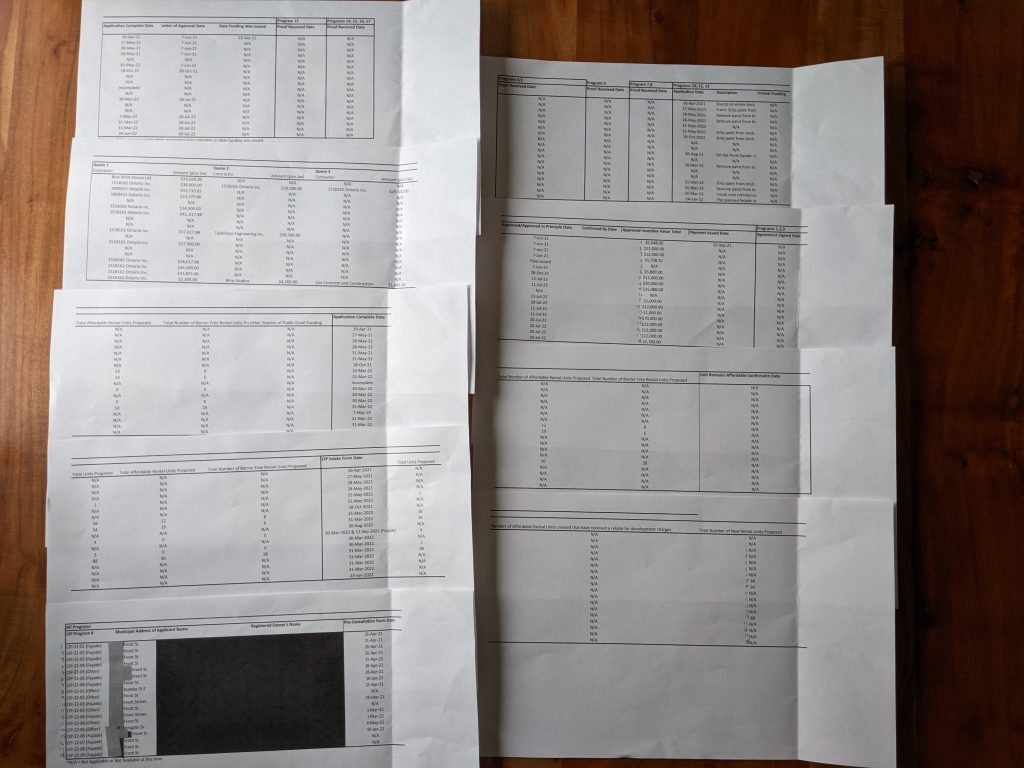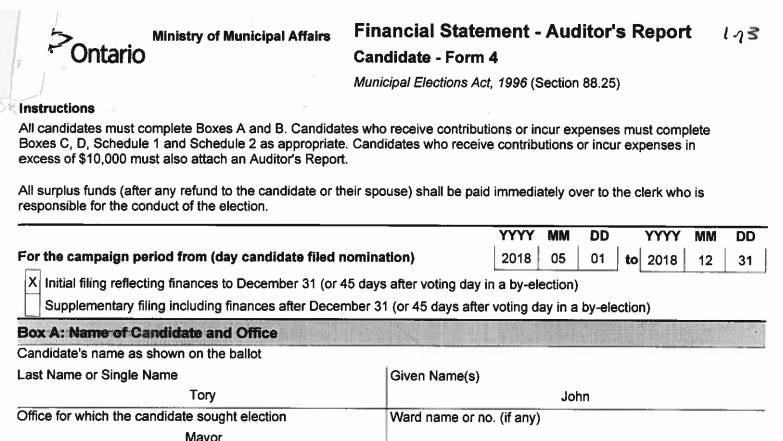If a municipal record, report, email, contract, memo, report, database or other document is not publicly available through an Open Data portal, meeting management software (eg. CivicWeb) or municipal website, and contacting the department responsible for the information was not successful, you can request a copy by submitting a freedom of information (FOI) request.
Every person has a right of access to a record or a part of a record in the custody or under the control of an institution unless,
(a) the record or the part of the record falls within one of the exemptions under sections 6 to 15; or
Section 4 (1) of the Municipal Freedom of Information and Protection of Privacy Act
(b) the head is of the opinion on reasonable grounds that the request for access is frivolous or vexatious. [not serious, no value, to cause annoyance]
Each province and territory in Canada has its own access to freedom of information legislation. In Ontario, you can make a request online under the Freedom of Information and Protection of Privacy Act.
For the federal government and institutions, you can make a request online under the Access to Information Act.
What institutions can information be requested from?
Records can be requested from the municipality itself, as well as the following institutions:
- School board
- Municipal service board
- City board
- Transit commission
- Public library board
- Board of health
- Police services board
- Conservation authority
- District social services administration board
- Local services board
- Planning board
- Local roads board
- Police village
- Joint committee of management or joint board of management
- Municipal Property Assessment Corporation
- Local housing corporations (Social housing providers such as the Hastings Local Housing Corporation run by the County of Hastings, which services Belleville and the surround areas) – Find your local housing program
What information can be requested?
Subject to the Municipal Freedom of Information and Protection of Privacy Act, any person may, at all reasonable times, inspect any of the records under the control of the clerk, including,
(a) by-laws and resolutions of the municipality and of its local boards;
Section 253 (1) of the Municipal Act
(b) minutes and proceedings of regular, special or committee meetings of the council or local board, whether the minutes and proceedings have been adopted or not;
(c) records considered at a meeting, except those records considered during that part of a meeting that was closed to the public;
(d) the records of the council;
(e) statements of remuneration and expenses prepared under section 284. 2001, c. 25, s. 253 (1).
The principle of freedom of information laws is “Open by Default“, meaning all information held by government institutions is available to the public by default, unless it falls under one of a limited number of specific exceptions (see below) where it needs to stay private to protect privacy, confidentiality and security.
If one of the exemptions does apply, the municipality must disclose as much of the record as can reasonably be severed without disclosing the information that falls under one of the exemptions.
Exceptions
Discretionary
A request may, at the government’s assessment, be refused if the subject matter being considered could be reasonably expected to:
- contain draft bylaws, draft private bills and records of meetings that are authorized by statute to be held in the absence of the public, unless:
- a draft or the subject-matter has been considered in a meeting open to the public, or
- the record is more than 20 years old
- reveal advice or recommendations within the institution by an officer, employee or consultant, unless it contains:
- factual material
- statistical survey
- report by a valuator
- environmental impact statement or similar record
- a report or study on the performance or efficiency of an institution
- feasibility study or other technical study, including a cost estimate, relating to a policy or project of an institution
- report containing the results of field research undertaken before the formulation of a policy proposal
- final plan or proposal to change a program of an institution, or for the establishment of a new program, including a budgetary estimate for the program
- report of a committee or similar body within an institution, which has been established for the purpose of preparing a report on a particular topic
- report of a body which is attached to an institution and which has been established for the purpose of undertaking inquiries and making reports or recommendations to the institution
- reasons for a final decision, order or ruling of an officer or an employee of the institution made during or at the conclusion of the exercise of discretionary power conferred by or under an enactment or scheme administered by the institution.
Law enforcement
- interfere with a law enforcement matter
- interfere with an investigation undertaken with a view to a law enforcement proceeding or from which a law enforcement proceeding is likely to result
- reveal investigative techniques and procedures currently in use or likely to be used in law enforcement
- disclose the identity of a confidential source of information in respect of a law enforcement matter, or disclose information furnished only by the confidential source
- endanger the life or physical safety of a law enforcement officer or any other person
- deprive a person of the right to a fair trial or impartial adjudication
- interfere with the gathering of or reveal law enforcement intelligence information respecting organizations or persons
- reveal a record which has been confiscated from a person by a peace officer in accordance with an Act or regulation
- endanger the security of a building or the security of a vehicle carrying items, or of a system or procedure established for the protection of items, for which protection is reasonably required
- facilitate the escape from custody of a person who is under lawful detention
- jeopardize the security of a centre for lawful detention
- facilitate the commission of an unlawful act or hamper the control of crime
- report prepared in the course of law enforcement, inspections or investigations by an agency which has the function of enforcing and regulating compliance with a law, unless it is a:
- report prepared in the course of routine inspections by an agency that is authorized to enforce and regulate compliance with a particular statute of Ontario.
- law enforcement record if the disclosure would constitute an offence under an Act of Parliament;
- law enforcement record if the disclosure could reasonably be expected to expose the author of the record or any person who has been quoted or paraphrased in the record to civil liability; or
- contains information about the history, supervision or release of a person under the control or supervision of a correctional authority
They may also refuse to confirm or deny the existence of a record to which these apply. However, these exceptions do not apply to a record on the degree of success achieved in a law enforcement program including statistical analyses unless disclosure of such a record may prejudice, interfere with or adversely affect any of the matters referred to in those subsections.
Mandatory
A request must be refused if the subject matter is:
- Information received in confidence from other governments;
- Third party information, if supplied in confidence, and where disclosure could prejudice the interests of a third party;
- Personal information about individuals other than the requester where disclosure would constitute an unjustified invasion of personal
privacy
Note: The name of a business owner, professional or official is not personal information
Personal information does not include the name, title, contact information or designation of an individual that identifies the individual in a business, professional or official capacity as per Section 2 (2.1).
For example, in requesting the address of the business and name of the business owner was redacted from the application tracking documents, citing Section 14 (Personal Information). I appealed these redactions citing Section 2 (2.1) and the names and addresses were then provided in full.
Records
Frequently requested information under MFIPPA includes:
- Correspondence (e-mails, texts, letters, memos, chat messages, possibly phone call records, etc.)
- Procurement bidding processes, proposals and contracts
- Expense reports
- By-laws and resolutions
- Meeting minutes
- Property records, such as building records, plans and permits (available to the property owner or their legal representative)
- Fire incident reports
- City planning development and committee of adjustment records (Planning Act)
- Ambulance call reports (records are made available to the patient or their legal representative)
- Court records
- Environmental records, such as notices of violation, soil and groundwater analyses results
- Police reports
Records can come in a variety of formats, including:
- Correspondence (e-mails, texts, letters, memos, chat messages, etc.)
- Databases (spreadsheets)
- Videos
- Reports (PDFs)
- PowerPoint presentations
Real examples of past Freedom of Information requests can be found on some municipalities’ Open Data portals:
Secret Canada, a project by The Globe and Mail, is an online database of over 320,000 FOI summaries for requests filed from April, 2010, to March, 2023 from across all jurisdictions and levels of government. Their website is the best source of advice, inspiration and guidance for filing FOI requests. They also have a list of stories they’ve published using information from FOI requests. You can get updates about the project by subscribing to the newsletter.
Personal information
You can also request your personal information, which is information recorded about an individual, and includes information relating to:
- Race, national or ethnic origin, colour, religion, age, sex, sexual orientation or marital or family status
- Education or the medical, psychiatric, psychological, criminal or employment history
- Financial transactions in which the individual has been involved
- Identifying number, symbol or other particular assigned to the individual
- Address, telephone number, fingerprints or blood type of the individual,
- Personal opinions or views of the individual except if they relate to another individual
- Correspondence sent to an institution by the individual that is implicitly or explicitly of a private or confidential nature, and replies to that correspondence that would reveal the contents of the original correspondence
- Views or opinions of another individual about the individual
- Name if it appears with other personal information relating to the individual or where the disclosure of the name would reveal other personal information about the individual
Section 34(1) requires municipalities to publicly provide an index of all personal information banks (PIB) under their control. A PIB is a collection of personal information that is organized and capable of being retrieved using an individual’s name or an identifying number or particular assigned to the individual. For example, see Durham Region’s Directory of Records and Personal Information Banks or Quinte West’s records directory.
Note: Personal information about another person may be requested in certain cases, for example if you have written consent or entitlement (eg. lawyer requesting on behalf of their client or parent on behalf of child) or does not constitute an unjustified invasion of privacy.
How to submit a municipal FOI request
- Download, print, and fill out the request form (municipalities may have their own version, but this one will work too)
- Write a letter describing the records you’re requesting. Secret Canada has some great letter templates for requesting different kinds of records.
- Write a cheque for $5 – the mandatory fee for record preparation and copying – payable to the institution eg. “City of Belleville”
- Mail it to your municipality’s town office to the attention of the Clerk, for example:
Freedom of Information/Access to Information Coordinator
City Hall – Clerk’s Office
169 Front Street
Belleville, Ontario K8N 2Y8
Alternatively, you can submit the document and payment in-person at City Hall. Municipalities will typically accept cash, debit, credit or cheque payments.
The municipality must make records available, deny access or notify the requester of any delay within 30 calendar days of receiving a formal request with the required fee.
Request fees
Application fee
There is a mandatory and non-refundable application fee of $5 that must be submitted along with the request letter.
Preparation fee
The fees for preparing the records requested are:
- Searching for records is $7.50 per 15 minutes
- Preparing records for disclosure is $7.50 per 15 minutes
- Developing a computer program to produce a record is $15 per 15 minutes
- Photocopies and printouts are $0.20 per page
- $10 for each CD
A fee estimate will be provided to you if processing a request will cost over $25. If the estimate is over $100, you will be required to pay a 50% deposit before the institution will proceed with the request.
If the request involves a large number of records or requires an extensive search a fee estimate may be provided to the requester and a deposit of 50% must be received by the City prior to processing the request.
Important Note: You have the right to request a waiver of fees if the total charges incurred for preparing the records will cause financial hardship or if the information will benefit public health or safety.
Make your request as specific as possible. Find the document title, reference/ID number and file type of the records that have the information you’re looking for by searching Open Data portals, websites and other publicly available documents (eg. meeting minutes, studies, annual reports, etc.).
If you’re unable to find then and are unsure what kind of records might exist, try calling the FOI coordinator of the institution. They are required to assist the public, and most are happy to.
Be sure to include a statement specifying that you would like the information sent electronically. This will reduce the time it takes them to process the request and avoid the printing or photocopying of documents, reducing the preparation fees charged. And if you don’t, you may receive completely unusable paper print outs of a project tracking spreadsheet like I did:

Municipal FOI request template
General records
To whom it may concern,
This is a request under this jurisdiction’s freedom of information legislation for records held by [institution].
I request the all information associated with [name of program/public servant] between [start date] and [end date] including, but not limited to, the tracking document(s) for each and every [project], including all of the following information, for each project:
Municipal Address of Property
Application Date
Application Complete Date
Payment Issued Date
Please provide a machine-readable, itemized database, spreadsheet or dump/export (e.g. Microsoft Excel, Access, SQL or CSV file format, not PDF).
I would like this information sent electronically.
John Smith
123 Example St
City, Province, Postal Code
Phone number, Email addressPersonal information
To whom it may concern,
This is a request under this jurisdiction’s freedom of information legislation for records held by [institution].
Please identify and provide access to inspect and correct all of my personal information records which I have not previously requested.
Please identify and provide all S34 [section 34 of the Act] Personal Information Bank index or records relating to my personal information records which I have not previously requested.
I would like this information sent electronically and that the “original electronic versions” of records are disclosed, if available.
John Smith
123 Example St
City, Province, Postal Code
Phone number, Email addressHow to appeal an FOI decision
If you are denied access or disagree with an institution’s decision regarding their requests, you can file an appeal with the Information and Privacy Commissioner (IPC) within 30 days of receiving the decision by completing the online appeal form.
If completing the online appeal form isn’t an option, you can alternatively mail the following documents:
- Completed appeal form
- The file number of the request (eg. FOI 2023-14)
- Copy of your original request
- Copy of the decision letter
- Cheque or money order in the amount of $10 (for personal information) or $25.00 (for general records) payable to the Minister of Finance.
To the following address:
Office of the Information and Privacy Commissioner of Ontario (IPC)
Information and Privacy Commissioner
2 Bloor Street East, Suite 1400, Toronto ON M4W 1A8
If you are denied access or disagree with an institution’s decision regarding their requests, you have 30 days to appeal the decision with the IPC after the notice of decision is given (Section 20(8)), which is the date you actually receive the FOI decision/response – not the date on the response letter as claimed in this decision letter I received from the City of Belleville:

I received the response documents by email 1 week after the date of the letter, but the 30 day period did not start until I received the email, contrary to what the letter claimed.
Example municipal Freedom of Information (FOI) request forms
Here are the FOI forms of 2 municipalities – Sudbury and Belleville – and a comparison of their accessibility and user experience.
Good: Sudbury
- Fillable PDF form
- Communication preference: Telephone/Mail, Email
- Method of access preference: Electronic copy (USB), paper copy
- Payment options: Cash, Credit, Debit, Cheque, Money Order
- Submission options: Mail, Email
Poor: Belleville
Now compare that to the form provided by the City of Belleville:
- Scanned copy of a photocopy, not fillable online
- Communication preference: Option not given, no email field (add your email anyway!)
- Method of access preference: Examine Original, Receive Copy (does not mention the option to get an electronic copy)
- Payment options: Cash, Credit, Debit, Cheque, Money Order
- Submission options: Mail, Email
Sources
- Ontario’s MFIPPA – A Mini Guide – Information and Privacy Commissioner of Ontario
- Freedom of Information Requests in Canada: How to & Examples – Cansumer
- National Database of FOI Summaries – Secret Canada (The Globe and Mail)
- How to File a FOI Request – Secret Canada



Comments
We want to hear from you! Share your opinions below and remember to keep it respectful. Please read our Community Guidelines before participating.